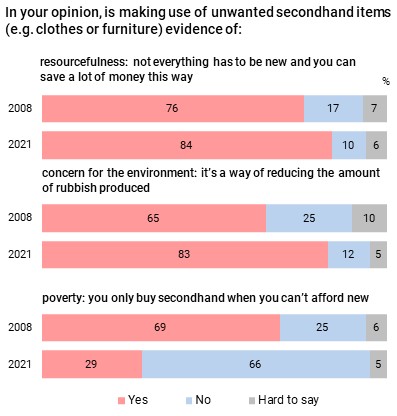28/2021
2021-09-20
Attitudes to Secondhand Things
Since 2008 Polish people have completely changed their way of thinking about secondhand items. The percentage of people who associate using castoffs with poverty has plummeted (from 69% to 29%), while the belief that this is evidence of caring for the environment has become widespread (a jump of 18 points, from 65% to 83%). At the same time the opinion that making use of castoffs is a sign of resourcefulness has also increased in currency (84%, a rise of 8 points).

|
More on this subject in the CBOS report.
This ‘Current Events and Problems’ survey (374) was conducted using a mixed-mode procedure on a representative sample of named adult residents of Poland, randomly selected from the National Identity Number (PESEL) register.
Respondents independently selected one of the following methods:
– Computer Assisted Personal Interview (CAPI);
– Computer Assisted Telephone Interview (CATI), respondents receiving researchers’ telephone numbers in an introductory letter from CBOS;
– Computer Assisted Web Interview (CAWI), where respondents filled in the online questionnaire independently, gaining access by means of a login and password provided in an introductory letter from CBOS.
– Computer Assisted Personal Interview (CAPI);
– Computer Assisted Telephone Interview (CATI), respondents receiving researchers’ telephone numbers in an introductory letter from CBOS;
– Computer Assisted Web Interview (CAWI), where respondents filled in the online questionnaire independently, gaining access by means of a login and password provided in an introductory letter from CBOS.
In all three cases the questionnaire had the same structure and comprised the same questions. The survey was carried out between 1 – 11 July 2021 inclusive on a sample of 1166 people (67.7% using the CAPI method, 21.4% CATI and 10.9% CAWI).
CBOS has been conducting statutory research using the above procedure since May 2020, stating in each case the percentage of personal, telephone and internet interviews.





